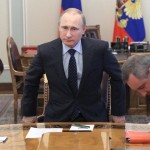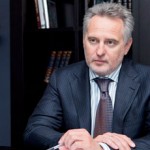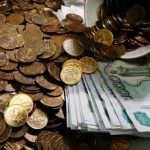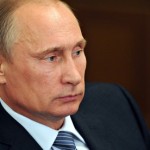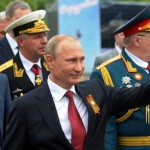Putin Clears Crimea Annexation as Ukraine Signs EU Pact
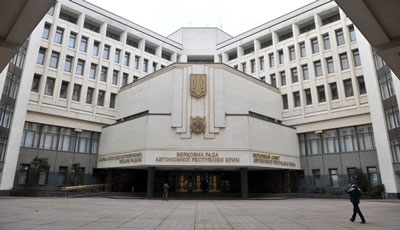
Russia completed the process of annexing Crimea and the European Union signed a political pact with Ukraine, escalating the worst standoff between Russia and the West since the Cold War.
Russian President Vladimir Putin signed legislation approved by lawmakers needed to absorb the Black Sea peninsula and its port of Sevastopol from Ukraine. In Brussels, the EU signed the political part of an Association Agreement with Ukraine, a deal whose rejection last year by ousted President Viktor Yanukovych triggered the dispute between Russia and its former Soviet-era enemies in the West.
“We have much work ahead” on integrating Crimea to conform with Russian law, Putin said after the signing ceremony in the Kremlin. He called on lawmakers to do everything possible to facilitate the change.
With Russia also massing troops near Ukraine’s eastern border and protests by pro-Russian activists in the east and south of Ukraine — the second most populous former Soviet state with more than 40 million people — have raised concerns that the Kremlin may push further into its neighbor.
Russia’s Micex Index dropped 2.1 percent to 1,292.79 by 2:33 p.m. in Moscow. The yield on Russian government bonds due February 2027 jumped the most in a week, rising 27 basis points, or 0.27 percentage point, to 9.57 percent.
Freezing Relations
The EU, which is moving more slowly than the U.S. on sanctions, added 12 names to their list of Russians and Ukrainians punished with asset freezes and travel bans.
The bloc, which will publish the new names later this afternoon, acted a day after the U.S. penalized 20 more Russian officials and business leaders as having ties to Putin. Western nations are signaling that Russia may face further repercussions if it does not stop what they see as destabilizing actions in Ukraine.
“The EU will freeze its political relations with Russia at the highest level,” Polish Prime Minister Donald Tusk said at an EU summit in Brussels. “There won’t be any summits between national governments and Russia either.”
The EU, Russia’s biggest trading partner, said today it would consider “targeted” curbs on business and investment. A separate order signed by Obama yesterday authorized potential future penalties on sectors of the Russian economy, including financial services, energy, metals and mining, defense and engineering.
Sanctions Widen
“We’re taking these steps as part of our response to what Russia has already done in Crimea,” President Barack Obama said at the White House yesterday. “We’ve been working closely with our European partners to develop more severe actions that could be taken if Russia continues to escalate the situation.”
The EU said today that Putin hasn’t crossed the destabilization threshold. While the bloc said it will start to consider curbs on business and investment, special trading relationships that several European countries have with Russia, coupled with the fallout from the debt crisis that came close to wrecking the euro, are frustrating a tougher response.
Sanctions require the agreement of all EU governments, a consensus-building process that can’t match Putin’s speed in mobilizing troops in Crimea, staging the secession referendum and moving toward annexation.
European leaders vowed to wean the EU off oil and gas imports from Russia, echoing a pledge made in 2008 after Russia fought a 5-day war with another neighbor, Georgia, over a breakaway province. The bloc relied on Russian suppliers for almost 32 percent of its gas imports and 35 percent of its oil imports in 2010, according to EU data.
Bargaining Power
This time, the leaders set a mid-year deadline for crafting a “comprehensive” plan to diversify energy sources away from Russia. Poland, which relies on Russian gas-export monopoly OAO Gazprom for about two-thirds of its consumption, wants a strategy to increase the bloc’s bargaining power.
EU governments also halted bilateral meetings with Russia and the Group of Seven industrial powers will go back to consulting among themselves, suspending the G-8 that included Russia.
Russia’s Foreign Ministry is proposing retaliatory steps, as “unanswered sanctions may whet appetites to impose new measures,” against specific sectors of Russian economy, Deputy Foreign Minister Grigory Karasin said today at the Federation Council meeting shown on state-run Rossiya 24 television.
Inner Circle
Putin later said that Russia “should refrain from reciprocal steps for now.” Russia is ready to work with Ukraine’s parliament, Foreign Minister Sergei Lavrov said at the Federation Council’s meeting, and he accused the EU and U.S. of having supported mass unrest in the Black Sea country.
Those targeted by the U.S. yesterday include billionaire Gennady Timchenko, a co-founder of oil trader Gunvor Group Ltd., and Arkady Rotenberg, a former judo partner of Putin whose companies won more than $7 billion of contracts for the Winter Olympics.
It also includes Bank Rossiya in St. Petersburg, which U.S. officials said has $10 billion in assets and is the 17th largest bank in Russia. It and Rotenberg’s SMP Bank said today that U.S. payment-systems operators MasterCard Inc. and Visa Inc. stopped servicing their cards. Putin said he planned to open an account at Bank Rossiya, News service Interfax reported.
“They know that the sanctions for us are absolutely unlawful and they will create artificial and unnecessary barriers on the road to normal communication,” Lavrov said. He added that characterizing Russia’s takeover of Crimea as “annexation” was an “insult” to the region’s citizens and their “undeniable right to express their will.”
(By James G. Neuger, Ewa Krukowska and Olga Tanas)
Source: bloomberg









